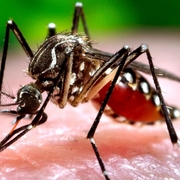
Community member contracts Zika Virus in Central America
The Tulare County Public Health branch has confirmed that individuals residing in Tulare County have tested positive for the Zika virus after getting bitten by mosquitoes during recent travels in Central America. The first case of Zika virus in Tulare County was confirmed on August 3, 2016; and another has been confirmed resulting in two cases.
“Community members who travel to Mexico, Central and South America, and other countries at high-risk for Zika transmission should understand the risks of travel to those areas and take extra precautions to protect themselves and their sexual partners,” said Public Health Director Jason T. Britt. “Women who are or may become pregnant are strongly encouraged to postpone travel to areas where Zika virus transmission is ongoing."
Zika virus is spread primarily through bites from Aedes aegypti mosquitoes. Though this species has been detected in Tulare County, Britt states, “There have been no reports of mosquitoes carrying the Zika virus locally.”
Zika virus infection during pregnancy can cause fetal demise or detriment, including microcephaly, convulsions, and developmental defects. Zika can also spread through sexual contact with infected persons; if a pregnant woman’s sexual partner has traveled to an area with active Zika spread, they should use protection throughout the pregnancy.
Infected individuals may not experience symptoms, but symptoms may include mild illness for two to seven days with fever, joint and muscle pain, skin rash, and redness of the eyes. Treatments for the disease include rest, fluids, and fever relief.
The best form of protection against Zika is protection against mosquito bites. All community members, especially pregnant women, should consult their doctors before traveling to areas with active Zika virus transmission.
If community members must travel, they should guard against mosquito bites by:
•Using mosquito repellent
•Protecting skin by wearing hats, light colored long sleeved shirts, and pants
•Using insecticide-treated mosquito nets for sleeping
•Staying in screened-in and air conditioned areas
•Receiving health recommendations and, for pregnant women, prenatal care appointments before and after travelling
Tulare County Public Health has previously released information about the Zika virus, travel precautions, and testing protocols for local providers. Again, there is minimal risk of contracting the Zika virus from local Aedes aegypti mosquitoes (which bite primarily during the day); however, residents should still protect themselves from mosquito bites as Delta Vector District has reported an upsurge of mosquitoes testing positive for West Nile Virus.
To protect the privacy of the infected individual, Tulare County Public Health will not release any identifying information.
Please visit the CDC’s website for the most updated information about the list of countries with active Zika virus: http://wwwnc.cdc.gov/travel/page/zika-information.
